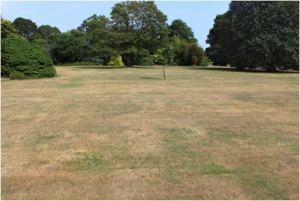=========================================
SEEKING THINGS ABOVE
“If then you were raised with Christ, seek those things which are above,
where Christ is, sitting at the right hand of God. “(Col. 3:1)
Volume II Number 12
March 2022
=========================================
Dorcas, a Fond Remembrance
by Friends
Bill Feist
 She was married to a non-Christian. I met her years after the “battles” were fought over the importance and role of the Lord in her life. She sketched for me one time what some of those battles were, only because she had come to volunteer to talk to any of our girls who were thinking of marrying a man who was not a Christian. At this point in her life, things looked “easy,” as she stood her ground and her husband no longer refused to stop for worship on the Lord’s Day when traveling or tried to interfere anymore in other areas that involved her commitment to the Lord. Yet she assured me that it had not been an easy “row to hoe.”
She was married to a non-Christian. I met her years after the “battles” were fought over the importance and role of the Lord in her life. She sketched for me one time what some of those battles were, only because she had come to volunteer to talk to any of our girls who were thinking of marrying a man who was not a Christian. At this point in her life, things looked “easy,” as she stood her ground and her husband no longer refused to stop for worship on the Lord’s Day when traveling or tried to interfere anymore in other areas that involved her commitment to the Lord. Yet she assured me that it had not been an easy “row to hoe.”
I learned that her husband had decreed from the very beginning of their marriage that none of his money was going to some church! He supported her and the family well but steadfastly refused to allow one dime of his money to be used for the Lord’s cause. She worked with her own hands, making arts and crafts all year long for one big weekend “show.” It was from this activity that she gained the funds she used for the Lord’s service. Her talent was much in evidence in these shows, and local people and others who had heard of her talent anticipated her yearly sale.
Among the many things she did with this revenue was to help provide assistance to Christians who had needs, contribute on the first day of the week and take food to people who needed it. All the children in the local assembly knew her for her sugar cookies with almond icing whenever they were ill.
This good sister could easily have excused herself from any responsibility to the Lord, saying, “My husband refuses to provide me with any funds for ‘church work,'” but she did not. Instead, she labored with her own hands while being a “stay-at-home mother” to provide for those who had need. This unnamed sister, unnamed because she still lives in her old age, and others like her serve as a model for all women, as does her spiritual namesake, Dorcas.
Acts 9:36-42 records all that we know of Dorcas. Yet what insights we are able to obtain by studying this first-century sister who spent her life in acts of kindness and charity. When we think of the word “serve,” Dorcas should automatically come to mind. She possessed a servant’s heart, and it was this that the widows showed to Peter as much as “the tunics and garments which she had made while she was with them” (9:39). These articles of clothing served as a silent but eloquent testimony to all who viewed them of the kind of heart Dorcas had.
Death overtook Dorcas in the midst of a life of blessed service. Her brethren sent for Peter, who was nearby, imploring him not to delay in coming to them. Possibly they sent for Peter prior to Dorcas’ death, hoping he would heal her. What a scene greeted Peter when he arrived. He found the body of Dorcas laid out in an upper chamber, attended by the widows she had assisted in life — weeping and commending the deceased for her praiseworthy life. Their commendation was like Dorcas’s virtues, not in word, but in deed. They showed the garments she had made and bestowed upon them. The very backs of these widows praised Dorcas for the gifts she had made for them. Doubtless, there were other acts of kindness she had done, but this evidence was presented as a tribute to Dorcas’ servant heart. Dorcas was remembered for the things she left behind when death overtook her. She now rests from her labors, and her works follow her (Rev. 14:13).
We can all serve God with whatever talents or gifts we have, but we must serve while we can. Scripture never presents a “no-talent” person. Dorcas simply did what she could, as did our unnamed sister above. She saw a need and an opportunity that challenged her talent, and she acted.
The question posed by Dorcas is, “What legacy will I leave behind after my death?” Dorcas was raised back to life in the midst of the “viewing” before her funeral. She saw how her death was affecting others. Think about it, what kind of funeral do you want? We are determining day by day the kind of funeral we shall have. Actually, the funeral service itself is unimportant: an eloquent eulogy, the many floral tributes, the tears of loved ones, etc., will have no effect on our eternal destiny. When our bodies lie motionless in death, God and men will apprise how well we have used these few short years entrusted to us. It matters little what man’s assessment is, but our eternal destiny depends on God’s assessment. What will God’s appraisal be of my life?
Biblical Insights, Vol. 6, No. 10, Oct. 2006.
__________
Pray Without Ceasing
Mike Johnson
 I Thessalonians 5:17 says, “Pray without ceasing.” This verse is in the midst of a series of short admonitions given by Paul near the close of the book of I Thessalonians. He had just said Christians should “rejoice always.” These two admonitions can be connected, as prayer often removes obstacles that stand in the way of joy. Another way to express it is “the way to rejoice evermore is to pray without ceasing.”
I Thessalonians 5:17 says, “Pray without ceasing.” This verse is in the midst of a series of short admonitions given by Paul near the close of the book of I Thessalonians. He had just said Christians should “rejoice always.” These two admonitions can be connected, as prayer often removes obstacles that stand in the way of joy. Another way to express it is “the way to rejoice evermore is to pray without ceasing.”
What does it mean to “pray without ceasing”? This admonition does not mean we are to engage in “nonstop” prayer; it does not mean that our lips are always to be moving. Vines, in his word studies, says that the word used here means “unceasing, without ceasing, is used with the same significance as the adjective, not of what is not interrupted, but of that which is constantly recurring . . . .” The Christian, therefore, is to be regularly involved in prayer. It is to be a regular part of his life.
Romans 12:12 says that the Christian should be “rejoicing in hope, patient in tribulation, continuing steadfastly in prayer.” The NASB says, “devoted to prayer.”
How about you? Is prayer a regular part of your life? Or is it, instead, something you turn to only in an emergency? If that is the case, you are not “praying without ceasing.” Of course, prayer is a duty, but it should also be a great joy and privilege.
__________
The Possibility of Apostasy (5)
The Vine & the Branches
(John 15:1-6)
Mike Johnson

John 15:1-6 records the Parable of the Vine and the Branches. It says:
I am the true vine, and My Father is the vinedresser. Every branch in Me that does not bear fruit He takes away; and every branch that bears fruit He prunes, that it may bear more fruit. You are already clean because of the word which I have spoken to you. Abide in Me, and I in you. As the branch cannot bear fruit of itself, unless it abides in the vine, neither can you, unless you abide in Me. I am the vine, you are the branches. He who abides in Me, and I in him, bears much fruit; for without Me you can do nothing. If anyone does not abide in Me, he is cast out as a branch and is withered; and they gather them and throw them into the fire, and they are burned.
We learn that Jesus is the vine, and his disciples are the branches. If a branch does not produce fruit, Christ purges it, and it is then cast into the fire and burned. He points out the need to abide in Him, and we do this by bearing fruit.
This parable conclusively teaches the possibility of apostasy. It seems apparent that these verses discuss lost people as they would be thrown into the fire and burned. Therefore, the advocate of the “Impossibility of Apostasy” doctrine must conclude that these verses speak of one who only professes Christianity. They would say the one represented by the “unfruitful branch” was never saved from the start. Ben M. Bogard, a well-known Baptist debater from many years ago, responded to John 15 in this way. “Now notice. There is the vine and the branch. There are two sorts of professed Christian—the real and the nominal. The professors and possessors—you can’t tell the difference by looking at them, for some of them camouflage so completely they seem to be in the Lord.”
In another debate, D.N. Jackson stated, “The vine was in Christ in the sense that your heart may be in a thing sometimes. How is that? You’ll say my heart is with you, and yet it may be just a profession.”
There is no doubt he is speaking of saved people. In verse two, Jesus said, “every branch IN me” that beareth not fruit. So the branch would be “in Him.” It does not say, “every branch in me professionally that does not bear fruit, he takes away.” Nor does it mean, “every branch not in me, but is so camouflaged that people cannot tell if they are in me, that beareth not fruit he takes away.” He also told them (v. 3), “You are already clean because of the word which I have spoken to you.” Does this not describe a saved person? When he said, “abide in me,” this indicates they were “in Him” at that time. Jesus was not urging those who “professed” to be in Him to “abide in Him,” but those who were actually in him.
There may be cases where we cannot tell if a person is a genuine Christian or not. Yet, Christ knows those who are His (2 Tim. 2:19), and Jesus said, “every branch in me.”
Jesus is clearly showing that those in a proper relationship with God could, by not bearing fruit, cease to be in a proper relationship with God and thus be lost!
Other Articles in Series
__________
An Atheist’s View of Life

I will live my life according to these beliefs
God does not exist.
It is just foolish to think
That there is a God with a cosmic plan
That an all-powerful God brings redemption and healing to the pain and suffering in the world
Is a comforting thought, however
Is only wishful thinking
People can do as they please without eternal consequences.
The idea that
I am deserving of Hell
Because of sin
Is a lie meant to make me a slave to those in power
“The more you have, the happier you will be;”
Our existence has no grand meaning or purpose
In a world with no God
There is freedom to be who I want to be
But with God
Everything is fine.
It is ridiculous to think
I am lost and in need of saving.
A Christian’s View On Life
(read from bottom to top)
Related Article
“Demands a Designer”
__________
It Doesn’t Take Much to
Feed a Corpse
Dalton Key
 Those of us living in the Texas Panhandle have been enjoying a strange and remarkable Spring. Due to several weeks of above-average rainfall, the usually parched, arid earth has become a virtual paradise, exuding life with luscious blades of green.
Those of us living in the Texas Panhandle have been enjoying a strange and remarkable Spring. Due to several weeks of above-average rainfall, the usually parched, arid earth has become a virtual paradise, exuding life with luscious blades of green.
A good friend fussed that he had already mowed more grass this year, by the first of June, than he mowed all summer long last year. His point: this year’s greenery is beautiful to look at but more difficult to take care of than the dirt of last year’s drought.
He was right and about more than grass. More effort has always been required to care for that which is alive and growing than for that which is dead and decaying. It doesn’t take much food to feed a corpse.
This principle is even true concerning churches. Vibrant, healthy congregations demand effort and hard work — they require the toils, prayers, and sweat of an energetic membership. By contrast, dead churches are easier to care for. More often than not, they just want to be left alone, being allowed to slowly return to the spiritual dust from which they came.
The next time you feel inclined to complain about the effort, the work, the sacrifice the church asks of you, remember this: dead churches, steeped in the stench of decay, make few demands; living churches are the ones requiring something of you!
Related Articles
_________________________________________
Audio Messages

Short Bible Message
Put Away Anger
(Ephesians 4:26-27)
Sermon
Confident Salvation
Greg Chandler
================================================
Editor: Mike Johnson
Home

